Tag Archives: squid
California’s Squid Fishery: The Largest in the U.S. and an Economic Powerhouse
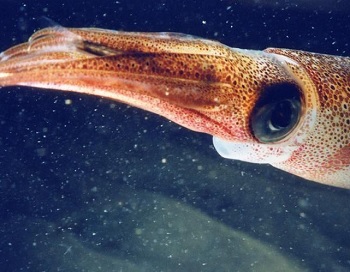 California holds a unique distinction in the United States as home to the largest squid fishery by both volume and revenue. While most Americans might think of squid as a side dish or appetizer at seafood restaurants, in California, market squid fishing has a deep-rooted history and serves as a significant contributor to the state’s commercial fishing economy. California’s market squid (Doryteuthis opalescens), commonly known as opalescent squid, not only drives revenue and jobs in the fishing industry but also exemplifies how sustainable practices are becoming integral to modern fisheries. From humble beginnings to MSC-certified status, California’s squid fishery is a fascinating example of how one invertebrate species has created waves in the fishing world. more, >>CLICK TO READ<< 15:21
California holds a unique distinction in the United States as home to the largest squid fishery by both volume and revenue. While most Americans might think of squid as a side dish or appetizer at seafood restaurants, in California, market squid fishing has a deep-rooted history and serves as a significant contributor to the state’s commercial fishing economy. California’s market squid (Doryteuthis opalescens), commonly known as opalescent squid, not only drives revenue and jobs in the fishing industry but also exemplifies how sustainable practices are becoming integral to modern fisheries. From humble beginnings to MSC-certified status, California’s squid fishery is a fascinating example of how one invertebrate species has created waves in the fishing world. more, >>CLICK TO READ<< 15:21
Tuna selling at a higher price for some local fishermen
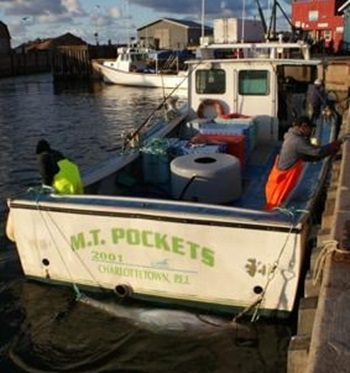 This year’s tuna season has been described as successful by some eastern PEI fishers. Allen Fay fishes out of North Lake. “There are lots of fish around,” he said. “They’re fetching a much better price than earlier years.” Fisherman Lucas Lesperance has had a similar season. “They’re definitely up in prices. It’s the same old story; supply and demand,” said Mr Lesperance. Fishing out of Naufrage, he has caught five tuna so far, the biggest of which being 490 lbs. “This year we were a little further offshore (to start), they were hanging around deeper waters but have moved closer with the bait,” he said. more, >>CLICK TO READ<< 10:35
This year’s tuna season has been described as successful by some eastern PEI fishers. Allen Fay fishes out of North Lake. “There are lots of fish around,” he said. “They’re fetching a much better price than earlier years.” Fisherman Lucas Lesperance has had a similar season. “They’re definitely up in prices. It’s the same old story; supply and demand,” said Mr Lesperance. Fishing out of Naufrage, he has caught five tuna so far, the biggest of which being 490 lbs. “This year we were a little further offshore (to start), they were hanging around deeper waters but have moved closer with the bait,” he said. more, >>CLICK TO READ<< 10:35
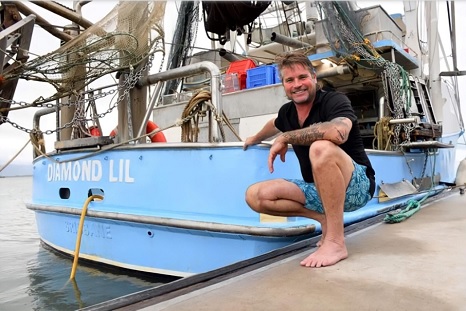
Goodbye F/V Santiego, Hello F/V Diamond Lil
It’s always sad when an old lady of the sea is shipped off to far away waters especially when they’ve been a permanent sight in Port Douglas for decades. Such is the case with the FV Santiego, built in Brisbane and owned by her skipper Laurie Moull. The fishing trawler has been in operation for 21 years and to see her sail off into the sunset is tinged with sadness. The old girl is now in Innisfail with her new owners and their gain is certainly our 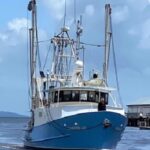 loss, however skipper Laurie is like a kid in a candy shop because he has a new gal in his life. He’s bought a new vessel named ‘Diamond Lil’ and she’s a ‘BIG UN’. Laurie and the crew will be proudly showing off Diamond Lil this weekend at the Port Douglas public jetty when they sell their new season prawns tomorrow and Sunday. Photos, >click to read< 08:14
loss, however skipper Laurie is like a kid in a candy shop because he has a new gal in his life. He’s bought a new vessel named ‘Diamond Lil’ and she’s a ‘BIG UN’. Laurie and the crew will be proudly showing off Diamond Lil this weekend at the Port Douglas public jetty when they sell their new season prawns tomorrow and Sunday. Photos, >click to read< 08:14
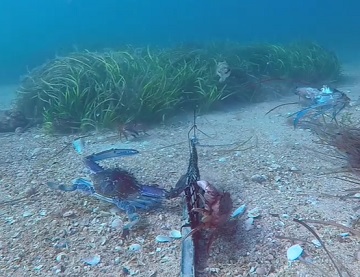
Crab cam video reveals a ‘hectic’ underwater world
An octopus attacking a blue swimmer crab over bait, a squid changing colours as it tries to steal the lot; these are some of the scenes being captured off Adelaide’s beaches to create an unlikely social media hit. Kayak fisher Andy Burnell has been attaching a camera to bait that he places on the ocean floor,,, “What amazed me was the grid pattern the squid displays as it first comes in. The “hectic” nature of blue swimmer crabs too has been startling, in particular their aggressive nature as they attack the camera and jostle for bait, having been swept into a frenzy. “Once they smell the bait in the water, they just come flying in,” >click to read< 08:06
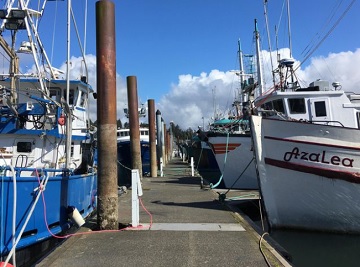
Oregon: Crab still tops state’s commercial fishing, but squid is gaining
Oregon’s crabbing industry is known as the state’s most lucrative in the fishing market, but another food from the sea is thriving off the coast: squid. In 2014, about 1,000 pounds of squid were caught by Oregon-based commercial fishers. Last year saw a huge jump, the haul was more than 10 million pounds. Josh Whaley, who has been fishing for squid since 2019,,, More market squid means more fishing opportunity and prompted Whaley to upgrade equipment to adjust to Seine fishing, a method of net fishing used to capture species close to the surface of the ocean, like sardines and squid. >click to read< 09:33
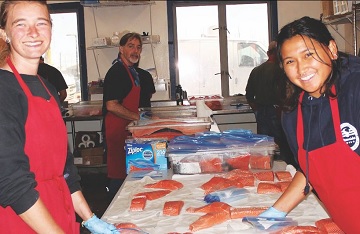
As Salmon and Squid Seasons Rebound, New Questions
Over the last few months, hundreds of boats have been fishing off of, or transiting along Santa Cruz County’s coastline. Industry analysts report plenty of bright spots in both the salmon and squid markets this season. But after some scientific studies were scuttled last year because of the coronavirus pandemic, and other research couldn’t be completed due to wildfires, fisheries management is still undergoing its own pandemic comeback, as climate change fears remain ever-present. “It’s definitely been a good season,” Scotts Valley resident Hans Haveman, the CEO of H&H Fresh Fish at the Santa Cruz Harbor says during a late-June interview. “Unfortunately, regulation from the state and feds have shut us down right when it’s goin’ good.” video, >click to read< 08:50
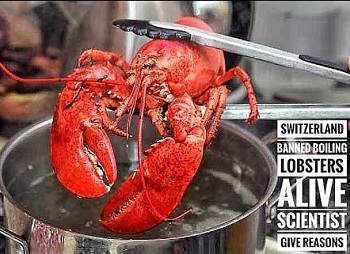
Speaking of the nutters! U.K. weighing ban on boiling lobsters alive
Under new amendments to animal welfare bill, crabs, lobsters, octopi, squid and other invertebrates, are set to be recognized as sentient beings that are capable of feeling pain. A simple google search will tell savvy home cooks looking to try their hand at cooking lobster to simply plunge the live creatures, headfirst, straight into a pot of (salted) boiling water. A piece of animal welfare legislation is currently winding its way through the U.K. parliament. “Lobsters struggle violently for approximately two minutes after being placed in boiling water,,, “scalding” animals to death is “unnecessarily cruel”, a belief that has been echoed by other animal welfare advocates and organizations, like the U.K. based Crustacean Compassion. Legislation banning boiling of lobsters alive has already been passed in a handful of countries, including New Zealand, Switzerland and Austria. >click to read< 20:34
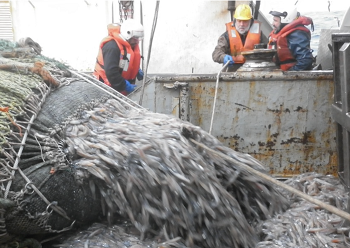
Falklands Squid – A Fisheries Management Success Story
A suite of conservation measures overturned a negative trend in squid abundance in the 1990s, turning this into a stable fishery with total annual catches ranging between 60,000 and 80,000 tonnes over the last three years. Most of these species have short life cycles with completely new generations joining the fishery every year. The annual turnover, together with climatic variability, results in high abundance fluctuations that make  squid fisheries notoriously difficult to manage and risky for fishing companies and their production chains. >click to read< During seasons, the stock biomass of squid remaining is estimated by depletion models, which are continually updated with mandatory daily reports of catch and effort from trawlers. >click to read< 14:45
squid fisheries notoriously difficult to manage and risky for fishing companies and their production chains. >click to read< During seasons, the stock biomass of squid remaining is estimated by depletion models, which are continually updated with mandatory daily reports of catch and effort from trawlers. >click to read< 14:45
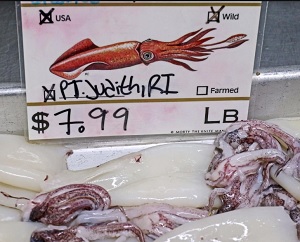
Most of R.I.’s calamari catch is processed in China. A local group wants to change that.
Also known as loligo, squid is Rhode Island’s most valuable fishery, worth about $28 million a year. More than 22 million pounds of squid are landed each year, most of it at the port of Galilee. But while the official appetizer of the Ocean State may arrive at a fishing port just a few miles away, most squid is shipped to the other side of the world, and all the way back again, before anyone gets to eat it. “One of the reasons that food policy councils exist, and there are some 350 food policy councils around the country, is to promote the growth and strength of local food systems,” she said. >click to read< 08:48
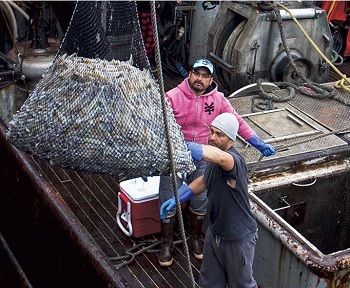
Squid fishing season is off to a good start in Monterey Bay after a dismal 2019.
The 2020-2021 commercial squid fishing season started on April 1 and dozens of boats can be seen dotting the horizon of Monterey Bay as the squid return, this year in better numbers. “This has actually been one of the best Aprils we’ve had since 2010,” says Pete Guglielmo, a buyer and processor with Southern Cal Seafood, Inc. “Usually when the squid show up this early in the season, it’s proved to be a very good fishing season for the industry.” The squid are also larger than they’ve been in the last several years, and in high demand. >click to read< 09:04
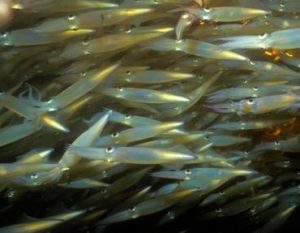
Gary Griggs – Salmon and squid
Salmon and squid both came on the radar this past week,,, These two marine animals have both shared some top billings in their importance to California’s commercial fishery in recent years, although there are significant year-to-year fluctuations. Calamari or market squid have been the number one fishery in tonnage caught, year after year… until last year. In typical years, 70,000 to 118,000 tons (118,000 is the allowable total catch) would be brought to the docks by the squid boats, making up consistently two-thirds of the entire commercial catch. >click to read< 10:46
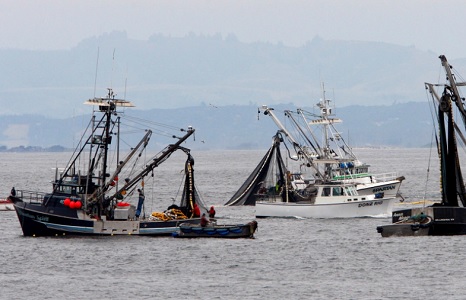
Squid are back in abundance in Monterey Bay
The squid fishery is among the most lucrative and productive in the state, frequently valued in the double-digit millions. According to the California Department of Fish and Wildlife, landings from California market squid (Doryteuthis opalescens) were over 34,000 short tons in the 2018-2019 season, generating more than $33 million in revenue. But according to Diane Pleschner-Steele, the executive director of the California Wetfish Producers Association, these charming and elusive animals can be difficult to pin down. The statement has proven true in the last couple of years. Spawning squid are targeted because they die shortly after they reproduce, and so fishing season — though technically open all year round — coincides with the spawning season. The catch is historically best in Southern California in fall and Central California in spring-summer. >click to read< 10:35

Exposure to pile driving noise associated with construction of docks, piers, offshore wind farms, cause squid to exhibit strong alarm behaviors
“This study is the first to report behavioral effects of pile driving noise on any cephalopod, a group including squid, cuttlefish, and octopuses,” says lead author Ian Jones, a student in the Massachusetts Institute of Technology-Woods Hole Oceanographic Institution Joint Program in Oceanography. Jones and his colleagues in the Sensory Ecology and Bioacoustics Lab at WHOI exposed longfin squid (Doryteuthis pealeii) to pile driving sounds originally recorded near the construction site of the Block Island Wind Farm in Rhode Island. >click to read< 11:52
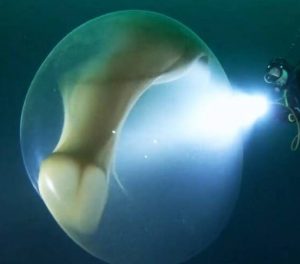
Divers Looking For WWII Shipwreck Find Enormous Enormous, Gelatinous Orb With Thousands Of Baby Squid Inside
Time and again, the deep sea reveals the most extraterrestrial-looking life we’ll ever see without actually leaving Earth. This was precisely the case during a recent dive in the waters near Ørstafjorden, Norway. According to the Daily Mail, the divers were on their way back after visiting a World War II shipwreck, when they stumbled upon a mysterious translucent orb floating just 50 feet above the ocean floor. >Video, click to read< 08:58
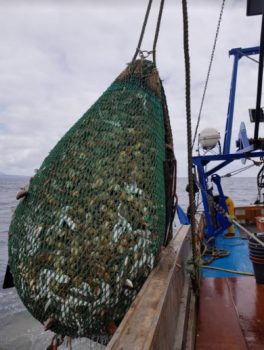
Manx scallop fishermen told to diversify fishing fleet for prawns, squid or white fish
Queen scallop fishermen are being invited to apply for grants to diversify into fishing for prawns, squid or white fish. The move comes as the island’s scallop industry comes under pressure over declining stocks. Major cuts in catch quotas were announced at the beginning of the queenie season in July and then all areas of the fishery except East Douglas were closed to allow stocks to recover. Now island queen scallop fishermen are invited to make grant applications to enable fisheries diversification. >click to read< 11:56
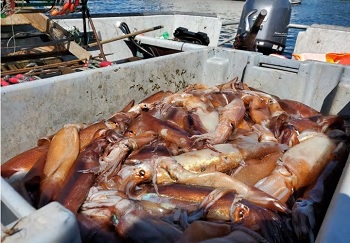
“You never know the mind of a squid” – The squid’s short lifespan makes it hard to study
Late this summer, squid showed up in abundance in many bays in the province, a sight not seen in several harbours, including Holyrood, for decades. Why have the squid finally come back?,,, The squid that come into Newfoundland and Labrador waters are called northern shortfin squid. While they’ve been seen in great numbers near beaches, squid don’t come here to spawn. In fact, according to Baker, there are no known spawning sites in all of Canada. “The female squid that we see here are actually immature and maturing,” >click to read< 08:09
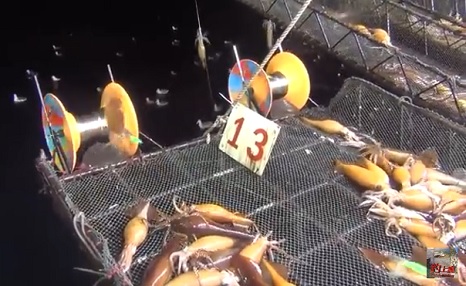
How China’s squid fishing programme is squeezing its neighbours and creating global sea change
Critics have said China keeps high-quality squid for domestic consumption, exports lower-quality products at higher prices, overwhelms vessels from other countries in major squid breeding grounds, and is in a position to influence international negotiations about conservation and distribution of global squid resources for its own interest. Fishing ships from China have accounted for 50 to 70 per cent of the squid caught in international waters in recent years, effectively controlling the supply of the popular seafood, according to an estimate by the Chinese government. A price hike for squid bought by the United States from China has been accompanied by a decline in quality, Video, >click to read<12:54
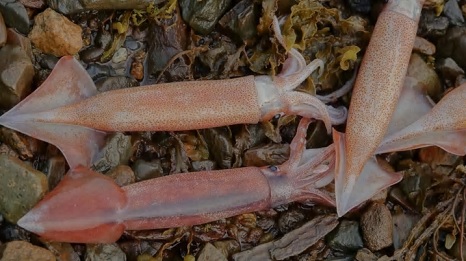
Squid washing ashore by the hundreds ‘live fast and die young’
An alarming number of squid are washing ashore along parts of Nova Scotia’s coast. Experts say although it’s unusual to see such mass die-offs, the deaths are part of the creatures’ “live fast and die young” reproductive cycle. Kent Smedbol is a scientist with the Department of Fisheries and Oceans and works with monitoring fish and invertebrate populations. He said northern shortfin squid are common in the waters off Nova Scotia. They range from the mid-United States right up to around Iceland. “They’re a highly mobile species, highly migratory and they only live for about a year,” said Smedbol. “So, they live fast and die young.” >click to read<10:34
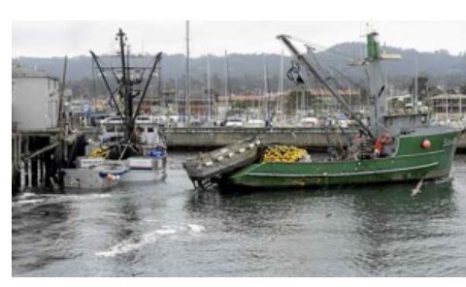
Monterey Bay fishermen working round the clock to pull in plentiful squid
In Monterey Harbor, a collection of at least eleven boats have been fishing for squid not far from shore since April 1, their lights visible off the coast at night. When the fishing is good, said Joe Russo, second captain and deckhand on the fishing vessel King Philip, it’s not uncommon for them to spend 24 hours a day netting tens of thousands of pounds of slippery squid with each return to shore. They continue through the spring, summer, and into early fall, if they don’t exceed the quota set by the California Department of Fish and Wildlife. >click to read<08:47
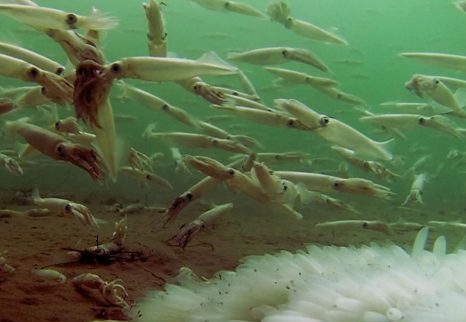
As Alaskan Waters Warm, Market Squid Extend Their Reach Northward
Market squid could represent an economic lifeline here, and it’s one that Alaskan fishermen are eager to begin experimenting with.,,, Though scientists haven’t yet nailed down the cause, populations of valuable species like king salmon and Pacific grey cod, Schramek says, have fallen to as little as one-tenth of even their 2015 levels. With those populations at historic lows, the Alaska Department of Fish and Game now bans their catch during parts of their historical fishing season. The bright spot, however, is a small, color-changing squid.>click to read<12:26
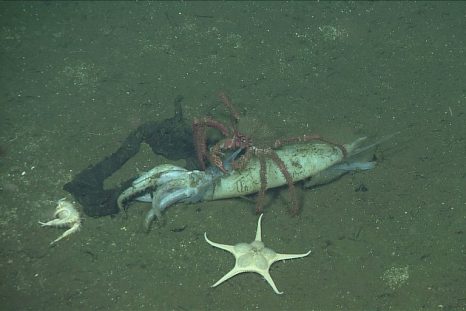
The Squid That Sink to the Ocean’s Floor When They Die
While the lives of squid are mysterious in many ways, one gruesome truth is that after mating comes death. First the male dies. Next the female, after making a little pouch of eggs, begins to starve. “She is unable to feed because the egg mass is in front of the mouth,” explains Henk-Jan Hoving, a deep sea biologist at Geomar Helmholtz Centre for Ocean Research in Kiel, Germany. “She probably gets energy from the breakdown of her own tissue, either from the liver or the mental tissue. This is how she stays alive, basically.” Then, once the female is dead and the eggs have hatched, her body will often float to the ocean’s surface and get eaten by birds. >click here to read< 17:43
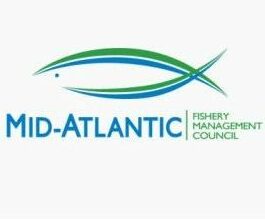
Mid-Atlantic Council Discontinues Development of Squid Buffer Framework
The Mid-Atlantic Fishery Management Council voted last week to discontinue development of a framework action that would have considered establishing a squid fishery buffer zone in waters south of Martha’s Vineyard and Nantucket. This decision will allow the effects of the recently-approved Squid Amendment to be realized prior to any additional action. The Council included the Squid Buffer Framework in its list of possible actions for 2017 in response to public concern regarding longfin squid fishing effort during Trimester 2 (May-August) in an area south of Martha’s Vineyard and Nantucket. click here to read the press release 13:28
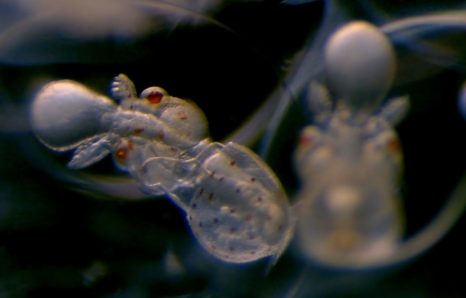
Squid: Coming to Life – How a cephalopod is born, in stunning microscopy footage
Produced by the evolutionary and developmental biologist Nipam Patel in his Patel Lab at the University of California, Berkeley, Squid: Coming to Life literally puts squid and cuttlefish development under the microscope. With a sparkling soundtrack and stunning microscopy footage, the short video shows the cephalopods transforming from embryos (when they develop in egg capsules) to hatchlings that emerge with the resplendent, colour-shifting skin they use for communication and camouflage. click here to watch the video 09:35

Working Waterfront: Several hundred tons of squid offloaded in Ventura
The smell of squid filled the air Tuesday morning at Ventura Harbor, where workers were bustling to offload hundreds of tons of it. The morning’s activities represented one of the largest squid hauls the harbor has seen in recent history. Approximately 300 to 400 tons of squid were brought into the harbor, representing a positive turn of events, said Frank Locklear, manager of commercial fisheries and technology at the Ventura Harbor Village Marina. click here to read the story 21:23
Seafood sold in U.S. grocery stores is being processed by North Korean labor
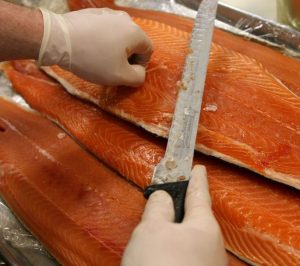 The case for knowing where your food comes from grows ever stronger: A new Associated Press investigation reveals America’s hunger for seafood is unwittingly helping fund the North Korean dictatorship. According to the report, North Korea is outsourcing workers to plants in China that process seafood, including wild-caught salmon, snow crab, and squid, that’s sold in U.S. grocery stores such as Walmart and Aldi — meaning American grocery shoppers “may inadvertently have subsidized the North Korean government as it builds its nuclear weapons program.” click here to read the story 22:31
The case for knowing where your food comes from grows ever stronger: A new Associated Press investigation reveals America’s hunger for seafood is unwittingly helping fund the North Korean dictatorship. According to the report, North Korea is outsourcing workers to plants in China that process seafood, including wild-caught salmon, snow crab, and squid, that’s sold in U.S. grocery stores such as Walmart and Aldi — meaning American grocery shoppers “may inadvertently have subsidized the North Korean government as it builds its nuclear weapons program.” click here to read the story 22:31
Poor common squid catches to continue in Japan
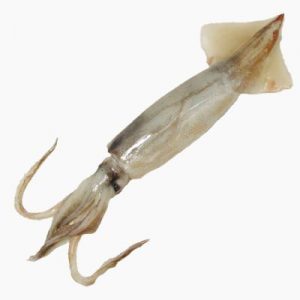 Poor catches of surume-ika, or Japanese common squid, are likely to continue this year. The squid is used in popular home dishes such as sashimi and is also sold in a form that is dried overnight. According to a long-term forecast about fishing conditions by the Japan Fisheries Research and Education Agency, arrivals of surume-ika squid to sea areas near Japan will likely be almost the same or lower compared with those in last year, when catch volumes of the squid were at a record low. Many fisheries experts share a view that the poor catches have been affected by decreases in the number of eggs the squid lay due to the decreasing sea water temperature in the East China Sea during recent years. click here to read the story 14:58
Poor catches of surume-ika, or Japanese common squid, are likely to continue this year. The squid is used in popular home dishes such as sashimi and is also sold in a form that is dried overnight. According to a long-term forecast about fishing conditions by the Japan Fisheries Research and Education Agency, arrivals of surume-ika squid to sea areas near Japan will likely be almost the same or lower compared with those in last year, when catch volumes of the squid were at a record low. Many fisheries experts share a view that the poor catches have been affected by decreases in the number of eggs the squid lay due to the decreasing sea water temperature in the East China Sea during recent years. click here to read the story 14:58
Mid-Atlantic Council to Hold Public Hearings for Squid Amendment
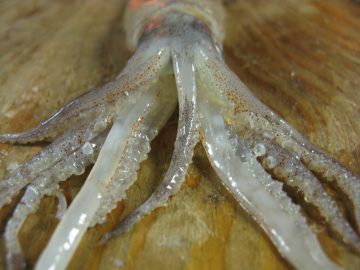 The Mid-Atlantic Fishery Management Council will hold nine public hearings in April and May 2017 to solicit public input on the Squid Amendment to the Atlantic Mackerel, Squid, and Butterfish Fishery Management Plan. The Council is also soliciting written comments on the amendment through 11:59 pm on May 18, 2017.The amendment considers measures to reduce latent longfin and Illex squid permits. Currently, a relatively small portion of vessels with limited access (“moratorium”) squid permits account for the majority of landings in most years. The Council is concerned that activation of latent permits in the squid fisheries could lead to excessive fishing effort, potentially resulting in shortened seasons and increased catch of non-target species. The amendment also considers measures to modify the management of longfin squid during Trimester 2 (May-August). The Council is considering this action because there is concern that the productivity of the longfin squid stock may be negatively impacted if excessive fishing in Trimester 2 does not allow sufficient spawning and/or successful egg hatching from egg mops. Locations of the hearings with time and date, public comment info, Click Here 17:54
The Mid-Atlantic Fishery Management Council will hold nine public hearings in April and May 2017 to solicit public input on the Squid Amendment to the Atlantic Mackerel, Squid, and Butterfish Fishery Management Plan. The Council is also soliciting written comments on the amendment through 11:59 pm on May 18, 2017.The amendment considers measures to reduce latent longfin and Illex squid permits. Currently, a relatively small portion of vessels with limited access (“moratorium”) squid permits account for the majority of landings in most years. The Council is concerned that activation of latent permits in the squid fisheries could lead to excessive fishing effort, potentially resulting in shortened seasons and increased catch of non-target species. The amendment also considers measures to modify the management of longfin squid during Trimester 2 (May-August). The Council is considering this action because there is concern that the productivity of the longfin squid stock may be negatively impacted if excessive fishing in Trimester 2 does not allow sufficient spawning and/or successful egg hatching from egg mops. Locations of the hearings with time and date, public comment info, Click Here 17:54






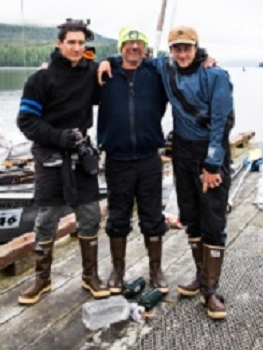
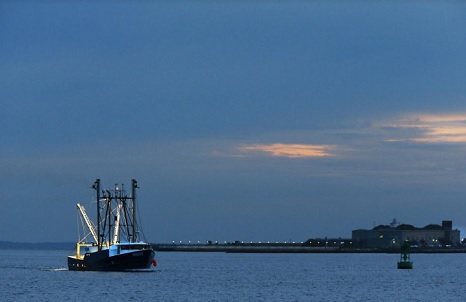



























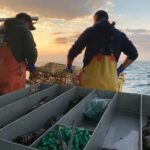
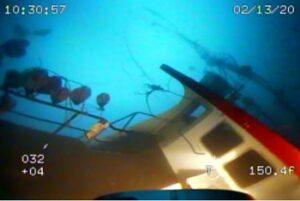




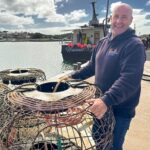





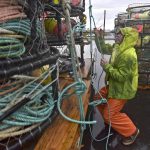
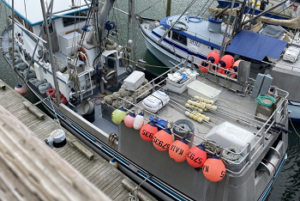




Seeking a 41 percent butterfish quota decrease, NOAA Fisheries Seeks Comments on Proposed Quotas for Squid and Butterfish
NOAA Fisheries proposes squid and butterfish quotas for the 2018-2020 fishing years and will maintain the mackerel quotas previously set for 2018. Based on the status of these stocks, we are proposing a 41 percent decrease in the 2018 commercial butterfish quota compared to 2017, and a 2 percent increase for longfin squid. Annual quotas for Illex squid would be maintained at current levels, as they have been since 2012. A March 2017 butterfish assessment update indicates that recent low recruitment may soon reduce biomass below target levels. click here to read the notice 12:55
Share this post